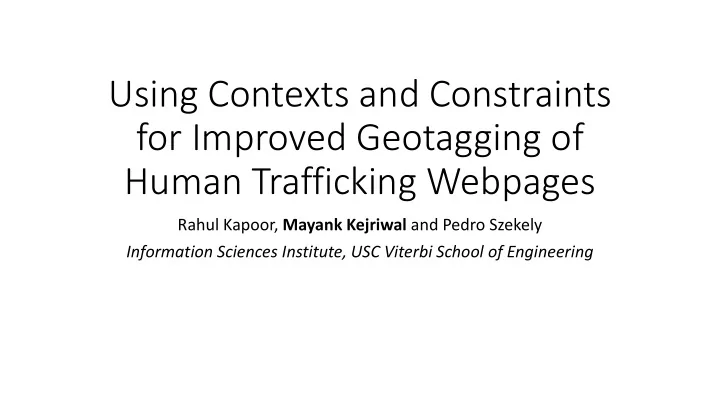

Using Contexts and Constraints for Improved Geotagging of Human Trafficking Webpages Rahul Kapoor, Mayank Kejriwal and Pedro Szekely Information Sciences Institute, USC Viterbi School of Engineering
Domain-specific Insight Graphs (DIG)
Geotagging HT webpages • Disambiguation problem: is Charlotte a name or city? Depends on context!
Geotagging HT webpages • Toponym Resolution • Examples – “Kansas City” is a city in the state Missouri as well as Kansas “Los Angeles” is also a town in Texas apart from being a city in California
Potential approach: use Geonames • Open database of geolocations • Contains 2.8 million populated places in the world along with 5.5 million alternate names • Each has a unique id and details of the state, country, latitude, longitude, population • Due to the large size, we use Trie based approach for high recall dictionary extraction More Information at http://www.geonames.org/
Using Geonames lexicon for extractions Common words like “the”, “makes”, “falls” are city names as well Some abbreviations used in the text are also marked as cities High Recall City “Want to be the girl Extractions “Want to be the girl Minnesota Actual Extractions Webpage Text that makes you..” that makes you..” “water falls near “water falls near Minnesota” Minnesota ” “This Cali girl..” “This Cali girl..” “AMBER CHASE “AMBER CHASE FEMDOM AVN” FEMDOM AVN ” “We provide NOM, “We provide NOM, DP, ATM, C2C..” DP, ATM , C2C..”
Contexts and constraints are both important • Constraints reflect domain knowledge (‘semantics’ of the domain e.g., that a city is in a state and a state is in a country; also, a priori knowledge) • Context reflect statistical (aka data-driven ) knowledge
Use context to train word embeddings • Many options in the literature (word2vec, random indexing...) • Random indexing found to work well for HT in previous work Hi gentlemen Charlotte visiting next ...
Useful for assigning probabilities to extractions (t-SNE) extractions in 200 dimension vector space
Context-based classifier
How do we encode constraints? • By itself, context is not enough; more can be done to improve performance! • Integer Linear Programming is an established framework • Requires manual crafting of: • Objective functions • Linear Constraints • Weights
OBJECTIVE FUNCTION WEIGHTS
Token Source Weight Captures relative importance of source of extraction City appearing in title is more important than those in footer
Context Weight Captures what extraction is more likely to be correct depending on the context “I am new to Charlotte ”, “My name is Charlotte ” - in the 1 st sentence the same word is more likely to be a city than in 2 nd
Population Weight Larger cities are more likely to be referred than smaller cities When someone mentions “Los Angeles”, he is most likely not referring to a small town in TX but the much larger city in CA
CONSTRAINTS
Semantic Type Exclusivity An extraction marked as multiple semantic types can be only one of those Charlotte_City + Charlotte_Name <= 1, means “Charlotte” can be either a city name or a name of a person at a time
Extractions of a Semantic Type Limits the number of extractions of a page LosAngeles_City + Seattle_City + Houston_City <= 1, means atmost one of the cities can be selected
Valid City – State-Country Combination The selected city should be in the selected country/state LosAngeles_US + NewYorkCity_US <= US, means if one of the cities on the left is selected, the country on the right must be selected
City-State/Country Exclusivity The chosen city has a corresponding state/country selected Portland_Oregon + Portland_Maine = Portland, means if Portland is selected, one of its corresponding states must be selected
Putting it together...
EXPERIMENTS
Dataset • Word Embeddings trained on a corpus of 90,000 web pages, using Random Indexing • Context classifier trained on 75 webpages • Groundtruth for ILP contained smaller corpus of 20 webpages coming from 10 different domains, having 175 geolocation annotations
Comparison The extractions from ILP are compared to: Random : A random selection from the extractions Top Ranked : The highest ranked extraction according to the context probabilities Metrics: Precision, Recall of extractions
Results Model Precision Recall Random 0.5 0.35714286 Top Ranked 0.61538462 0.57142857 ILP 0.78571429 0.78571429
Future Work Using Probabilistic Soft Logic as an alternative to model the problem ILP PSL As the factors affecting selection Probabilistic model with continuous increase, need to combine weights random variables allows to capture for objective function multiple factors Not possible to model complex Can model based on First Order Logic relations which affect extraction representation selection Each extraction is either selected or Each extraction can be assigned an not selected expectation value May take time to optimize Soft truth values enable faster convergence Refer: http://psl.linqs.org/
Recommend
More recommend